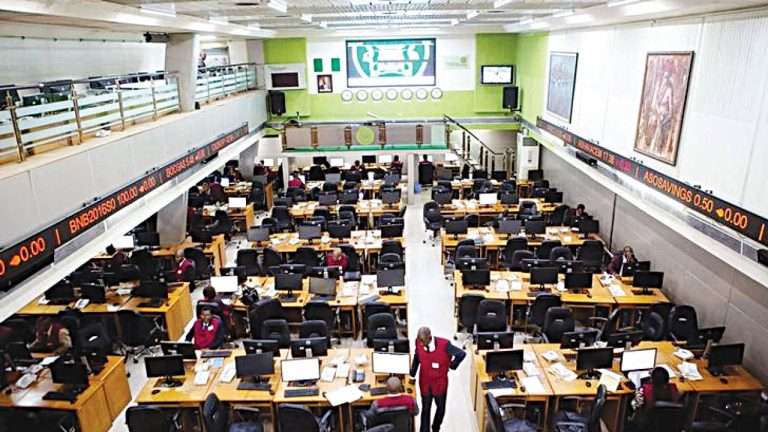Business
Vehicle Importation Drops By 40% As Clearing Charges Skyrocket, Dealers Lament
Published
1 year agoon
By
Editor
There was a drop of about 40 per cent in the number of imported vehicles that came into the country between January and October this year through the Ports & Terminal Multipurpose Limited compared to the figure for the same period of the previous year.
While a total of 192,287 units of vehicles came into Nigeria in the first 10 months of 2021, only 114,159 units were imported through the same terminal in the same period in 2022. The terminal is responsible for the importation of most vehicles coming Nigeria.
A document obtained exclusively by our correspondent from the Customs Public Relations Officer in charge of the PTML terminal, Muhammad Yakubu, showed that from January to October 2022, only 122 vessels berthed at the ports as against 167 vessels recorded within the same period in the previous year.
The document also showed that the terminal recorded a total number of 30,560 containers in the first 10 months of 2021 as against 24,181 recorded in a similar period of the current fiscal year. These figures showed a serious drop in activities in the terminal, which is known to be a Roll-On-Roll-Off terminal in Nigeria where almost 85 per cent imported vehicles coming into the country come through.
Clearing agents operating at the nation’s maritime industry have blamed inconsistent government policies and the newly introduced Vehicles Identification Number for clearing of imported vehicles as reasons behind the decrease.
The PTML chapter Chairman of the National Association of Government Approved Freight Forwarders, Mr Thomas Alor, also blamed the levy imposed on imported cars by the government for the decline, adding that the VIN was not giving them the value they paid for.
READ ALSO: 2023: Why Soludo, Obaseki, Nnamani, Others Are Ganging-up Against Obi
He said, “The levy, which they imposed on imported used cars, is what is affecting car importation. What is causing the drop in importation of vehicles is the value in clearance. The VIN valuation is not giving us the value, which we are paying now.
“What made the value high is because of the levy imposed on older vehicles; it is the reason for the high cost of clearance of those vehicles. When we started the VIN valuation, we were paying normal duty with the percentage of the duty until the government now imposed levies on old vehicles, which now increased the prices.”
Though he admitted that the levy had been there before now, Alor, however, said it was not up to five per cent as against the 15 per cent the clearing agents were now being asked to pay.
He stated, “The levy has been there but it was below five per cent, but now, it is about 15 per cent. Any time we engage the Customs on the issue of value, they tell us that we requested for the VIN. And we are saying yes, we requested for the VIN, but the VIN was not well articulated the way we asked them to do it; they later imposed levies on it and the high levy is bringing the value up.
“Now, some vessels come with only 45 vehicles; some even come with less than that. The only time that they recorded a huge import of vehicles here was like two or three vessels that came with damaged vehicles. Following the introduction of the VIN and levy, vehicle importation has dropped drastically. There are times here at the PTML when nothing is happening and people just play around here. Some vehicles come through other terminals as containerised cargoes.”
A former Chairman of NAGAFF, PTML chapter, George Okafor, said the reduction in importation was more than 40 per cent.
Okafor stated, “It is no longer news that we have almost 61per cent reduction in importation of vehicles, it is very clear and open, it is an open fact and it is caused by policies. The VReg (Vehicle Registration System) is causing problems; as I am talking to you now, to get VReg is hard and without it you can’t access anything. So, all these are making things difficult for clearing of cargoes and vehicles out of the ports; it is not a hidden thing.
“We are in a situation where a ship will come and will deliver almost everything in Cotonou and the little one we have here will be difficult to clear.”
He said smaller vehicles that cost about N500,000 to clear now required over N1m, which was responsible for the high cost of cars in the market.
READ ALSO: Binance Introduces New Investment Platform
Okafor added, “The VIN is still affecting us because the values of some of the vehicles are high. You know Nigerians rely so much on older vehicles because they are cheaper. Most rich Nigerians go for higher vehicles, you know in Nigeria it is either you belong to the higher class or the lower class. And those in the higher class buy vehicles from 2018 upwards and they can afford to clear them, but the lower class relies so much on older vehicles. And those older vehicles now are very expensive to clear; the vehicles we used to clear with N500,000 or N600,000 are now from N1m upwards.
“The cheapest vehicle like Toyota Corolla is now very expensive to clear. So, after calculating the cost of purchase, shipping and clearing here in Nigeria, you will find out that the car will be very expensive for someone in the middle class to buy. And the car will hang because you are paying the same thing with what a 2014 model of the same car is paying, so it will be difficult to buy.
“So, the people who are importing these cars are not even keen again to do the business; if they bring in the vehicles, a lot of people may not have the money to buy the cars. If you go to the PTML in Mile 2, there is almost no one there, because that is where all these small vehicles come through and TinCan is where the executive vehicles come through. So, you can see how it is affecting the whole thing.”
The PTML chapter Chairman of the National Council of Managing Directors of Licensed Customs Agents, Abayomi Duyile, said, “The VIN and the 30 per cent levy are the causes of the whole problem. You know when they introduced the VIN, it was part of what we were saying before that it was going to cause problems, but the Customs introduced it saying that it would make their job faster and all that. About a month after they introduced the VIN, they came with a 30 per cent National Automotive Council contribution, and we protested, they now removed it and changed it to a levy.”
“So with all these things, you find out that over N2m has been added to the prices of vehicles. And when (former President Olusegun) Obasanjo was there, they allowed vehicles of 15 years old to come in, but now the Customs, in their own wisdom, said such were old vehicles. Now, for example, a 2008 model car has now been classified along with a 2013 vehicle in terms of duty payment.
“So, when you bring in a 2008 model of a vehicle and you are paying duty for a 2014 model, it will be very expensive. So, when you clear a 2008 modelled vehicle as 2013 or 2014 in Nigeria, you may go bankrupt, because there is no way you can sell such a vehicle when cheaply you clear at the rate of 2014; that is why you see the drop at the PTML.
“These are the two major issues when you say 2005, 2006 and 2009 vehicle importers should pay the same duty as 2013, it is not done anywhere else in the world. So, you can imagine the people that the system has affected, some of their vehicles are still in the port as we speak; some have also abandoned their vehicles because already there is no point wasting money to clear a vehicle you can’t sell. The ones that have been cleared take time to sell.”
Dealers lament
Meanwhile, car dealers have lamented a serious drop in patronage as cars now seem to be above the reach of ordinary Nigerians.
A car dealer at the popular Berger Automobile Market, Lagos, who gave his name as Chinonso Stainless, told PUNCH that most of the dealers hardly record any customer in months as against what they used to see, especially when the Christmas season was approaching.
He said, “My brother, there is nothing happening here again because of the high duty rate; people who are bringing in cars are not many again. So, there are fewer cars in the market and the prices are very high; the turn up of buyers is very low. The patronage is not the way it used to be, people hardly buy cars now.
READ ALSO: Nigeria’s Poverty Exceeds World Bank Projection, Bayelsa, Four Other States Lead
“A 2003 Toyota Corolla that used to sell for N2.5m is now N3.5m, while the 2010 model of the same car is N4.8m. So, we are pleading with the government to bring down the duty on cars because as soon as the duty comes down, the prices will definitely come down.”
Another dealer, John Paul, said, “People now prefer to buy Nigerian used cars now instead of foreign used cars; even so, the Nigerian used car is also very expensive. You hardly see a clean Nigerian used car that is less than N1.5m; that is how expensive cars are now.”
The President, Association of Motor Dealers of Nigeria, Metch Nnadiekwe, did not take his calls as of the time of filing this report.
PUNCH
You may like
Business
Stock Market Review: FBN Holdings Leads 41 Others As Investors Gain N811bn
Published
1 day agoon
May 4, 2024By
Editor
FBN Holdings Plc has topped 41 other advanced equities to pull the Nigerian Exchange Ltd.(NGX) market indices up by 1.46 per cent, week-on-week, making investors gain N811 billion.
The market, having opened for four days in the week, following the May Day holiday, had FBN Holdings leading the gainers’ table by 32.68 per cent to close at N27 per share.
Sterling Financial Holdings followed by 27.75 per cent to close at N4.88, while UACN gained 24.60 per cent to close at N15.45 per share.
Julius Berger added 23.76 to close at N72.40, while Flour Mills rose by 20.66 per cent to close at N36.80 per share.
READ ALSO: Teenager Jailed For Life For Murder Of 16-year-old Boy At House Party
Conversely, Nascon Allied Industries Plc led the losers’ table by 17.03 per cent to close at N43.60, University Press trailed by 16.67 per cent to close N2.05 per share.
Neimeth International Pharmaceuticals shed 14.14 per cent to close at N1.70, Berger Paints Plc declined by 9.87 per cent to close at N13.70 and Vitafoam Nigeria lost 9.81 per cent to close at N17 per share.
Meanwhile, 42 equities appreciated in price during the week, higher than 27 equities in the previous week.
Thirty-six equities depreciated in price, lower than 43 in the previous week, while 76 equities remained unchanged, lower than 84 recorded in the previous week.
READ ALSO: Shell Set To Build Gas Pipelines In Oyo
Consequently, the All-Share Index and Market Capitalisation appreciated by 1.46 per cent to close the week at 99,587.25 and N56.323 trillion, respectively, in contrast to 98,152.91 and N55.512 trillion posted last week.
Similarly, all other indices finished higher with the exception of NGX Consumer Goods, NGX Oil and Gas and NGX Industrial Goods which depreciated by 0.26, 0.68 and 0.36 per cent, respectively, while NGX ASeM and NGX Sovereign Bond indices closed flat.
Meanwhile, a total turnover of 1.941 billion shares worth N32.644 billion in 35,807 deals was traded this week by investors on the floor of the Exchange, in contrast to a total of 1.839 billion shares, valued at N34.258 billion, that exchanged hands last week in 37,528 deals.
READ ALSO: Officer Who Shot Man Dead During Fuel Queue Tumult Identified — Lagos Police
The financial services industry measured by volume led the activity chart with 1.496 billion shares valued at N22.453 billion traded in 19,225 deals, thus contributing 77.08 and 68.78 per cent to the total equity turnover volume and value, respectively.
The consumer goods industry followed with 144.722 million shares worth N5.063 billion in 4,966 deals.
In the third place was the conglomerates industry, with a turnover of 109.978 million shares worth N1.539 billion in 2,064 deals.
Trading in the top three equities, namely Abbey Mortgage Bank Plc, Guaranty Trust Holdings Company Plc and Access Holdings Plc, measured by volume, accounted for 898.940 million shares worth N14.314 billion in 5,518 deals.
These contributed 46.31 and 43.85 per cent to the total equity turnover volume and value, respectively.
(NAN)
Business
BREAKIN: NDIC Increases Maximum Deposit Insurance Coverage
Published
4 days agoon
May 2, 2024By
Editor
The Nigeria Deposit Insurance Corporation (NDIC) on Thursday increased the maximum deposit insurance coverage levels for Deposit Money Banks from N500,000 to N5 million.
The Managing Director of NDIC, Bello Hassan, announced this in Abuja at a press conference, stating that it takes effect immediately.
He said, “For Deposit Money Banks, the increase of the maximum deposit insurance coverage from N500,000 to N5,000,000, would provide full coverage of 98.98% of the total depositors compared with the current cover of 89.20%.
READ ALSO: [BREAKING] Coastal Highway: FG To Pay N2.75bn Compensation Today
“In terms of the value of deposit covered, the revised coverage would increase the value of deposits covered by deposit insurance to 25.37% compared with the current cover of 6.31% of total value of deposits.
“The increase of the maximum deposit insurance coverage from N200,000 to N2,000,000, would provide full coverage of 99.27% of the total depositors compared with the current level of 98.76% and would increase the value of deposits covered by deposit insurance to 34.43% compared with 14.38% of total value of deposit, currently covered.
“The increase of the maximum deposit insurance coverage from N500,000 to N2,000,000 would provide full coverage of 99.34% of the total depositors compared with the current 97.98% and would increase the value of deposits covered by deposit insurance to 21.04% compared with 10.77% of total value of deposit, currently covered.”
READ ALSO: Mother Of Four Hacked To Death By Neighbour, Son In Edo
Hassan also stated that raising the maximum deposit insurance coverage for primary mortgage banks from N500,000 to N2,000,000 would provide full coverage for 99.99% of total depositors and increase the value of deposits covered by deposit insurance to 43.10% of the total deposit value, up from the current 40.60% cover.
The Corporation has also raised the maximum pass-through deposit insurance coverage for subscribers of Mobile Money Operators from N500,000 to N5,000,000 per subscriber.

Chairman of Dangote Industries Limited, Aliko Dangote has said that the devaluation of Naira created the biggest mess for the company in 2023.
Speaking at the annual general meeting of Dangote Sugar Refinery, Dangote said this affected lots of companies in the country.
He said: “We are doing whatever it takes to make sure that at the end of the day, we will be paying dividends because if you look at our dividends last year, it was almost 50 percent more so we will try and get out of the mess.
READ ALSO: Ex-policeman Who filmed Wife Having Wex With Her Superior Found Guilty Of Stalking
“The biggest mess created was actually the devaluation of the naira from N460 to N1,400. You can see almost 97 percent of the companies, especially in food and beverages businesses, none of them will pay dividends this year for sure but, we will try and get out of it as soon as possible.
“We want to see that at the end of the day, no matter how small, we will be able to pay some dividends, especially if there is a rebound of the naira.”

Man Dies On Top Of Married Woman In Akure

Soldier Dismissed For Sleeping With Colleague’s Wife

Kenya Deports Nigerian Captured On CCTV Assaulting Woman In Wheelchair [VIDEO]
Trending

 Politics5 days ago
Politics5 days agoWhy Candidate Who Needs Interpreter Can’t Be Edo Gov – Shaibu

 News4 days ago
News4 days agoEx-policeman Who filmed Wife Having Wex With Her Superior Found Guilty Of Stalking

 Metro4 days ago
Metro4 days agoMother Of Four Hacked To Death By Neighbour, Son In Edo

 News4 days ago
News4 days agoWhy Abia Policeman Dropped His Rifle, Uniform, Walked Away From His Job – Report

 Metro4 days ago
Metro4 days agoPolice Foil Cult Initiation In Edo, Arrest 35 Suspects

 News3 days ago
News3 days ago15-year-Old Public School Student Scores 362 In UTME

 Metro4 days ago
Metro4 days agoOutrage As Masquerades Brutally Flog Nurse Until She Falls In Gutter In Enugu [PHOTOS]

 News4 days ago
News4 days agoJUST IN: Police Arrest Mastermind Of Abuja-Kaduna Train Attack

 Politics5 days ago
Politics5 days agoEdo Poll: Youth Leader Tackles Orbih, Shaibu Over Anti-Ighodalo Stance, Wants Them Suspended

 Headline2 days ago
Headline2 days agoPHOTOS: Moment 23-year-old Miss Ecuador Beauty Queen Is Gunned Down In Hail Of Bullets





















